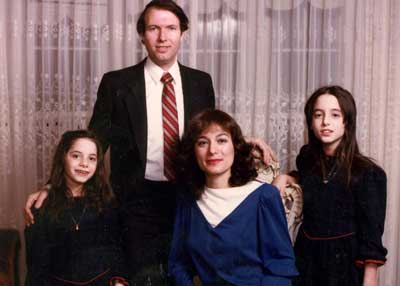Pair to Be Sentenced in Eight Murders Ordered by Mob Boss
By LARRY McSHANE AP
NEW YORK (AP) – Michal Greenwald Weinstein grew up pretending her father died of cancer, or maybe in a freak accident. The truth remained a secret to her family for nearly two decades.
Israel Greenwald, an unassuming diamond dealer, went to work in 1986 and never came home. It wasn’t until April that his killers were finally brought to justice: retired police detectives Louis Eppolito and Stephen Caracappa.
The pair was also convicted of seven other murders, all at the behest of a mob underboss, in one of the most sensational police corruption cases in the city’s history. The former detectives, who once worked as partners, were scheduled to return to U.S. District Court in Brooklyn on Monday to face sentences of life behind bars on their racketeering convictions.
In statements filed with the court, Weinstein, her sister, Yael, and their mother, Leah, detailed how their lives were torn apart by the murder of the family patriarch inside a Brooklyn parking garage. Greenwald was killed because of fears that he might become an informant.
His body, buried in a 5-foot deep hole and then covered by concrete, was undiscovered for 19 years.
“Losing a father at a young age is hard enough, but to lose a father in such a violent and mysterious way is nothing short of horrific,” Weinstein wrote. “I don’t know which crime was more monstrous, the actual murder or the concealment of his body.”
A witness testified that Eppolito stood guard while a man resembling Caracappa brought Greenwald into the garage and executed him.
Eppolito, 57, whose father was a member of the Gambino crime family, and Caracappa, 64, were respected detectives who worked for Luchese family underboss Anthony “Gaspipe” Casso between 1986 and 1990.
The eight murders were committed while the pair was simultaneously on the payrolls of both the police department and Casso. Eppolito and Caracappa – dubbed the “Mafia Cops” – received $4,000 a month from Casso, who also used them to get information from inside law enforcement. Their pay went up for the murders: They earned $65,000 for one killing.
Federal prosecutor Daniel Wenner described the case as “the bloodiest, most violent betrayal of the badge this city has ever seen.”
Caracappa, who retired in 1992, helped establish the city police department’s unit for Mafia murder investigations. Eppolito was a much-praised street cop despite whispers that some of his arrests came via tips from mobsters.
Eppolito also played a bit part in the mob movie “GoodFellas.” After retiring in 1990, he unsuccessfully tried his hand at Hollywood scriptwriting. In his autobiography, “Mafia Cop,” he portrayed himself as an honest cop from a crooked family.
The pair, both highly decorated, spent a combined 44 years on the force and eventually retired to homes on the same block in Las Vegas.
The sentencings won’t end the explosive case. Later this month, Eppolito will press forward with his request for a new trial based on his claim that his previous defense attorney failed to put on a competent defense.
Eppolito has asked for Casso to appear at that hearing. Casso, who was reportedly involved in 36 murders himself, claimed he had exculpatory evidence against the two ex-detectives.
The defense opted not to put him on the stand, and did not call either defendant as a witness.
Caracappa’s attorney has also left the defense team.
The racketeering convictions could be overturned because of the statute of limitations. The defense argues there was no ongoing criminal enterprise while the detectives were living in Las Vegas, making a racketeering charge legally untenable.
U.S. District Court Judge Jack B. Weinstein, while declining to throw out the verdicts himself, suggested the statute of limitation claim could work.
“It was not a strong case, and the government was warned that from day one,” Weinstein said at a May hearing. “There is a sound basis for appeal.”.

